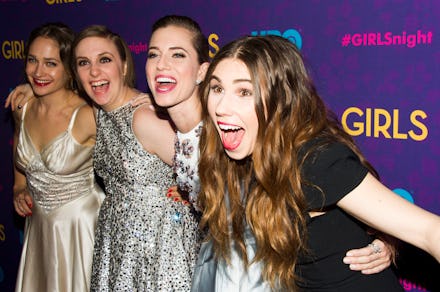Why Critics Can't Handle the Female Anti-Hero

The premiere of the third season of HBO's Girls this past Sunday marked the return of some of our favorite female characters on TV.
Well, "favorite" might be a strong word to describe how most viewers feel about Hannah, Marnie, Jessa and Shoshanna (or pretty much anyone else on the show). More apt words would probably include "off-putting" and "obnoxious." But these women, and the many characters like them that we're starting to see emerge, mark an important cultural moment: the rise of the female anti-hero.
Viewers and critics have no problem cheering on Walter White or Dexter Morgan as they sell drugs and slice up bad guys, but they find it difficult to watch the awkward and uncomfortable real-life situations that 'Girls' addresses.
There's been a recent shift in television to portray anti-heroines who encapsulate a complex humanity in a way we've never seen before. Sex and the City broke into the mainstream in the late '90s/early 2000s arguably despite its flawed lead women; there was enough glitz and glamour to cover up the fact that, as Emily Nussbaum wrote in the New Yorker, "it was one of the first television comedies to let its characters change in serious ways." We don't seem to remember it that way, however; Nussbaum writes that this tendency stems from "an unexamined hierarchy: the assumption that anything stylized (or formulaic, or pleasurable, or funny, or feminine, or explicit about sex rather than about violence, or made collaboratively) must be inferior."
There's been a backlash against the types of characters that recently popular shows like Girls, Netflix's Orange Is the New Black and HBO's Enlightened have brought us — anti-heroines like Hannah Horvath, Piper Chapman and Amy Jellicoe (and even ABC's Juliette Barnes on Nashville), who are too complex to be pigeonholed into a "Carrie" or a "Samantha." Viewers and critics have no problem cheering on Breaking Bad's Walter White or the blood spatter pattern analyst/serial killer Dexter Morgan as they sell drugs and slice up bad guys, but they find it difficult to watch the awkward and uncomfortable real-life situations that Girls addresses, and instead see its women as "annoying, selfish and entitled."
As Kerensa Cadenas writes in Bitch magazine, "The women of Girls are all intentionally annoying and, unlike with the leads of Sex and the City, there's been no attempt to make them more likeable [sic]. ... Male leads can ... screw over their families and become meth kingpins and still have the audience rooting for them. But Hannah Horvath's narcissism and nudity are reviled."
Girls, which won two Golden Globes in 2013 and was nominated for another one this year, has already been renewed for a fourth season. It's sharp and clever as it throws its female characters in our faces and says, "Deal with it." It's alienating simply because we're not used to being served up unpalatable women: women who are naked just because, who give themselves terrible haircuts, and who are frank, judgemental and do whatever they want without regard for others. Women who act in a way we're used to seeing only male characters act, which has unfairly branded them unlikable rather than well-crafted and complex.
Shows like Girls, Orange Is the New Black and Enlightened are not trying to portray unlikable women, but rather are trying to show that women are human beings, and therefore are sometimes self-obsessed, petty, childish, navel-gazing and in a constant struggle with morality. There's no easy Cosmo-quiz answer to "Which Girls character are you?" because the show offers no glossed-up version of ourselves to relate to and in whom we can find escapism. In fact, it gives us the opposite: women who remind us all too much of ourselves.
Women are socialized to be likable, and when we see TV characters who make no attempt to seem genial, charming, sympathetic, desirable or any other quality we've come to associate with femininity, there's a disconnect — something that has grated on many viewers and critics. But such characters have also resonated with many others precisely because they reflect real qualities of women, and depict women who don't care whether they're likable or not.
These programs particularly strike a chord with younger audiences because they deal with issues close to our hearts: being 20-somethings in a floundering economy; struggling with identity, sexuality and relationships; and striving for idealism and altruism while fighting against our selfish natures.
In 2012 Jessica Valenti wrote in The Nation, "What's better than being roundly liked is being fully known — an impossibility both professionally and personally if you're so busy being likable that you forget to be yourself."
The rise of the female anti-hero on this cross-section of shows is indicative of a cultural progression that lets women out of confined media representations. It's reflective of a desire to see not just "strong female characters," but human female characters, more fully knowable in their rawness and realness.